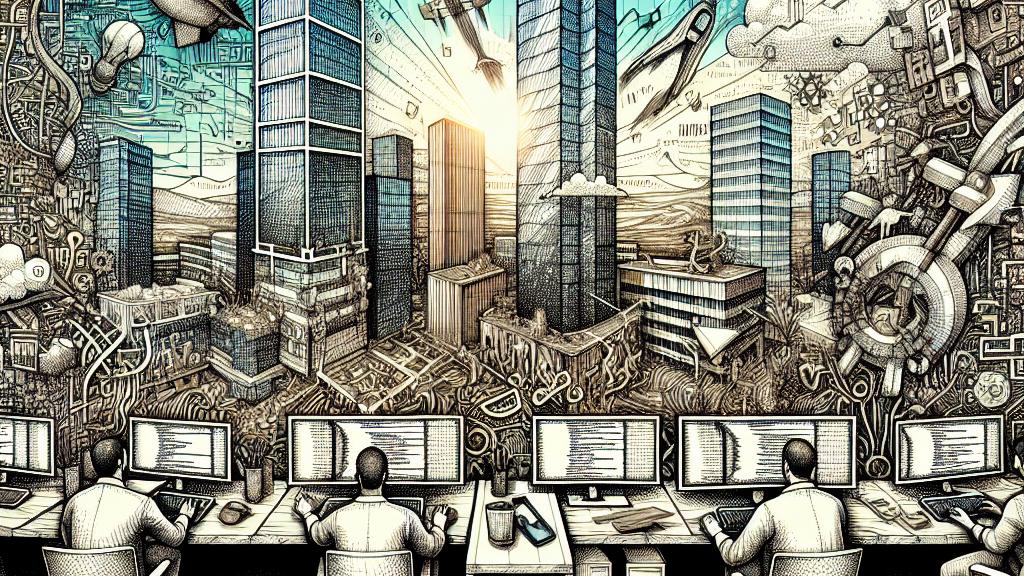A World Where Only Capable Engineers Thrive
Overview
- Today’s tech landscape demands excellence and performance from every team member.
- Underperformance can lead to swift exclusion from essential projects.
- True success springs from a unified team of skilled engineers.

The High-Stakes Environment of Software Engineering
Imagine entering the fast-paced world of software engineering at Amazon's bustling headquarters in Seattle, where innovation buzzes like electricity in the air. Here, the pressure to not just meet, but exceed expectations feels overwhelming. Developers are expected to deliver remarkable results every single day. Consider a talented engineer, driven by ambition and caffeine, who understands that every line of code they write has the potential to impact millions of users across the globe. This realization brings a heavy weight of responsibility; a single slip-up could derail a project and lead to disappointing outcomes. In this intensely competitive arena, the stakes could not be higher.
The Case of Gobou-kun
Now, let's dive into the story of Gobou-kun, an eager young engineer full of promise but still navigating the complexities of his new role. With stars in his eyes, Gobou-kun faced the harsh realities of project deadlines and high expectations. He would often seek clarification during meetings, asking questions that sometimes derailed the conversation and left his colleagues feeling fatigued. Picture him—bright-eyed and hopeful—yet struggling to maintain his footing as deadlines loomed. While his fellow engineers, seasoned and quick, whizzed through tasks, Gobou-kun’s frequent interruptions undermined momentum. This situation poignantly highlights the challenge of integrating fresh talent into established high-performing teams—how do you nurture newcomers without sacrificing progress?
The Unexpected Aftermath
Interestingly, after Gobou-kun was reassigned due to perceived performance issues, the remaining engineers experienced a remarkable shift. Suddenly, their meetings transformed from lengthy affairs filled with redundant explanations into dynamic, streamlined sessions focused on creativity and innovation. Freed from the burden of constant clarifications, each engineer flourished, rallying together around new challenges. The energy in the room was palpable—ideas flowed freely, and collaboration soared to new heights. This change underscored an eye-opening truth: when a team consists solely of capable engineers, an incredible synergy emerges, giving rise to productivity levels that can lead to successful project launches. Their achievements became not just a win for the project, but a testament to the power of collective capability.
Redefining Team Dynamics
Gobou-kun’s situation invites us to reflect deeply on the dynamics within tech teams. While diversity in skills and experiences undeniably enriches a group, the reality often prioritizes the necessity for high-performance. Think of a championship sports team where only the top players are selected for key roles, each trusted to deliver in high-pressure situations. In similar fashion, every engineer plays a critical role in the success of their team. Consequently, companies must be strategic in their selection process, ensuring that team members not only excel individually but also foster an environment where each person's strengths complement one another. The result? A high-functioning team that can tackle challenges head-on and innovate creatively.
Navigating the Harsh Realities
Ultimately, Gobou-kun's experiences serve as a cautionary tale in today’s competitive tech industry, where the mantra often becomes 'only the capable need apply.' This stark reality illustrates that those who can quickly demonstrate their value will thrive, while others may struggle to secure their place. The balance between nurturing new talent and maintaining momentum is delicate, yet crucial. In essence, while technical skills are vital, adaptability, teamwork, and relentless self-improvement reign supreme. Engineers who master the art of thriving in high-pressure situations will not only survive but also soar, carving out a successful career in a world that demands excellence without compromise.

Loading...